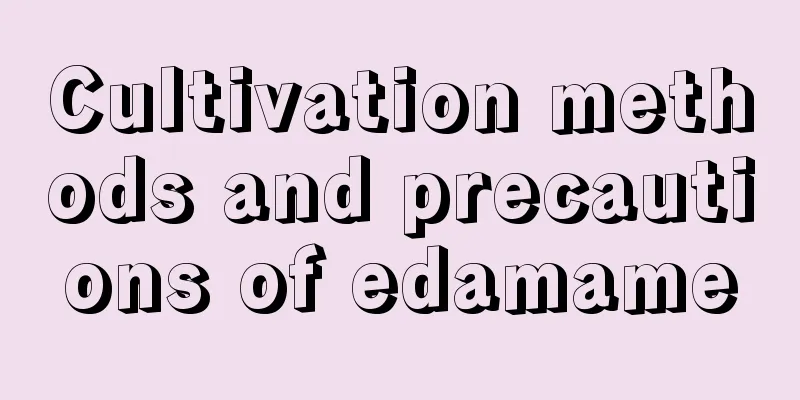Cultivation methods and precautions of edamame

1. Maintenance methods1. Temperature: It likes high temperature and is suitable for growing in areas with relatively high temperatures. The germination temperature of its seeds is around ten degrees. At fifteen degrees, the seeds germinate very quickly. The growth temperature should be controlled between twenty and thirty degrees. When the temperature is below fourteen degrees, the plant will not bloom. It is very sensitive to temperature during the growth period. If the temperature is too high, the plant will end the growth period prematurely. When the temperature is too low, the seeds of the plant will not fully mature. 2. Watering: It requires a lot of water during its growth period, especially when the seeds are developing, it needs to absorb a large amount of water. During this period, it generally needs to be watered every other day. When the plant reaches the seedling stage, it needs to be watered two to three times a week. When it reaches the pod-forming stage, it needs to be watered every other day. 3. Fertilization: It accumulates nutrients about thirty days before flowering. At this time, vegetative growth and reproductive growth proceed together, requiring a large amount of nutrients. During this period, fertilizer is required once every two weeks. The amount of fertilizer needs to be increased two weeks after the flowers bloom, because the beans will grow rapidly at this time. If the nutrient supply is insufficient, it will cause the plant to age prematurely and cause the flowers and pods to fall off. 4. Light: It is a short-day plant and does not have strict requirements for light. Normal light per day is enough, and ensure about five hours of light. 2. Breeding techniques1. Reproduction: It can be cultivated by direct seeding in the open field. Choose mid-ripening varieties and sow them directly through holes in the open air in early to mid-April. They can usually be harvested between June and July. 2. Weeding: When cultivating edamame, it is necessary to weed the field because weeds will compete with plants for nutrients. Therefore, it is necessary to remove the weeds regularly to avoid unnecessary nutrient consumption. 3. Problem Diagnosis1. Pests: The number one pest of the plant is the borer. During the growing season, it needs to be sprayed with carbendazim every week to enhance its resistance. If unfortunately infected, the infected plants need to be pulled out and destroyed, and the plants need to be sprayed with pesticides for prevention and control. It should be noted that plants sprayed with medicine cannot be picked and eaten for the time being, and should be picked after a week. 2. Pathology: If the branches and leaves of the plant turn yellow, it may be due to insufficient nutrients and you need to add nutrients to it. IV. Other issues1. Edible: edible. 2. Toxicity: non-toxic. |
<<: Cultivation methods and precautions of wolfsbane
>>: Cultivation methods and precautions of Shenjinhua
Recommend
Pests of White Orchid and Their Control
Red spider mites and scale insect pests on white ...
Broad bean planting time and technology
Broad bean is an annual or biennial herb of the g...
The Complete Book of Plant Poisons: You Must Know
1. Plants containing glycosides 1. Oleander: an e...
What to do if black spots appear on Anthurium leaves
1. Improper moisture If black spots appear on the...
The main value of agarwood trees
Medicinal value Medicinal agarwood is made when t...
How to change the soil of Anthurium
When to change the soil for Anthurium Every 1-3 y...
Pest and disease control of Chinese cabbage
Clubroot This disease mainly harms below the grou...
Temperature and climate requirements for growing cassia
Conditions for growing cassia The wood apple is a...
How to ferment fruit peels to make fertilizer
1. How to make fruit peel water Prepare a variety...
What to do if the tips of the leaves of Chlorophytum turn black
1. Proper shade 1. Reason: Chlorophytum comosum c...
How to plant purple bamboo
1. Prepare the ground for bed Choose fertile, loo...
How to grow the silkworm
1. Sufficient sunlight During the growth stage, s...
Don't let these 10 kinds of flowers get wet in the rain, otherwise they will die in half a day
Huahua checked the weather forecast today and fou...
Can azaleas be planted in the ground?
Can azalea be planted in the ground? Rhododendron...
When do lychees mature and when do they go on the market?
1. What is lychee? Litchi usually refers to the f...









